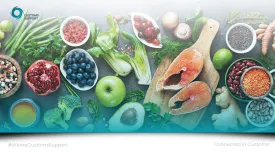What health risks are there in transporting peanuts?
Depending on where your peanuts are imported from, there is a risk of contamination by aflatoxins. These are a family of fungi that grow in warm and wet conditions, as is common in countries which grow peanuts.
If your shipment of peanuts has been contaminated, then the journey overseas creates the ideal conditions for the aflatoxins to grow.
For example, a container from Brazil takes approximately 21 days to reach the UK or 25 days to reach Rotterdam, and this doesn’t include the days loaded at either port awaiting transit or delivery.
During this time, the container is closed to the air, dark, and can get warm from the sunshine. Even a small contamination can become a serious problem by the time your container is delivered.
How is the risk of aflatoxins in peanuts controlled?
Depending on the country of origin, your peanuts will be classified into annex one or annex two by health authorities. Bear in mind that your rules of origin may change depending on your destination country, so do not assume a country is always in the same classification.
Annex one shipments are sent from countries that hold satisfactory health standards for the destination. Therefore, health authorities do not require the presentation of aflatoxin certificates.
Annex two shipments originate in countries where aflatoxins are a concern. Therefore, a sample of the peanuts must be tested in a lab before shipping, and an aflatoxin certificate created to confirm that the shipment has a satisfactory level.
Both annex one and annex two shipments require the creation of a Common Health Entry Document (CHED) for prenotification of arrival on the Import of Products of Animals, Food and Feed System (IPAFFS) when importing into the UK.
Brazil and China changed to annex one in the UK from 17th January 2023
Shipments of peanuts originating in Brazil and China, for import into the UK, have been reclassified to annex one. What this means is that your shipments of peanuts from these countries no longer require an aflatoxin report, and the CHED can be completed using the commercial documents only.
(NOTE: If your shipment has left China or Brazil before the 17th January, it still requires test reports for the import clearance to be granted. It is only shipments that ship after 17th January that will be granted the relief from moving to annex one.)
Do you need help with compliance when importing peanuts and other foods?
Customs Support are here for you. Our declarants provide import and export services throughout the UK and EU, assisting businesses like yours with local customs requirements across Europe.
If you’re looking to import peanuts or other high-risk foods, contact one of our customs consultants to ensure your goods meet health requirements before shipping.













